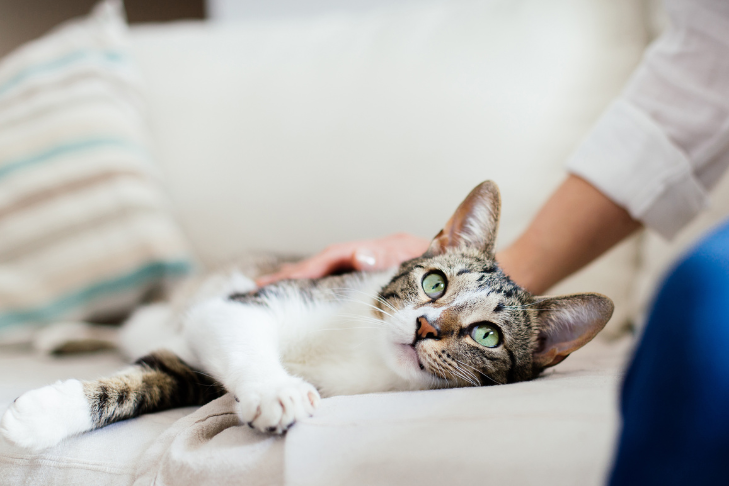Signs of a Healthy Cat: Weight, Coat, Diet, & Personality

As pet parents, we all want our cats to live long, happy, and healthy lives. But how can you tell if your feline friend is truly thriving? From a glossy coat to an active personality, there are a few key signs to watch for that can indicate your cat is in good health. Use this guide to spot the hallmarks of a healthy cat—and learn a few simple ways to support their wellbeing every day.
How to Tell If Your Cat Is in Good Health
Here are some simple signs that can help you assess your cat’s physical and emotional health at home:
1. Diet and Nutrition
A balanced, species-appropriate diet is essential for feline health. Cats require a diet rich in animal-based protein, taurine, and other vital nutrients. Make sure you're feeding high-quality cat food from a reputable brand, whether you shop online or at a trusted local pet store. Avoid fillers and artificial additives, and always follow feeding guidelines based on your cat’s age, weight, and activity level.
2. Healthy Weight
While every cat is different, the average adult domestic cat weighs around 8-12 pounds. However, breed plays a big role in healthy weight ranges:
- Large breeds like Maine Coons, American Bobtails, and Savannahs may naturally weigh up to 20 lbs.
- Smaller breeds such as Siamese, Cornish Rex, and Munchkin cats often fall below 8 lbs.
If you’re unsure whether your cat is underweight or overweight, check for a visible waist when viewed from above and feel for ribs under a thin layer of fat.
3. Coat, Skin, and Nails
A shiny, smooth coat is a sign of good health. A healthy cat’s fur should be soft, free of bald patches, and not excessively oily or flaky. Nails should be strong and not brittle or easily broken. Check their:
- Eyes – clear, bright, and free from discharge
- Nose – moist and free from crust or mucus
- Ears – clean inside, without redness, rash, or excessive wax
4. Behavior and Personality
Cats express happiness and comfort differently than dogs. A healthy, emotionally balanced cat will:
- Sleep regularly but also engage in play and exploration
- Purr often and “talk” with chirps or soft meows
- Feel confident and relaxed in their environment
Sudden changes in behavior—like hiding more than usual, increased aggression, or loss of interest in play—can be a sign that something’s off.

How to Keep Your Cat Healthy Long-Term
Even healthy cats need regular support to stay well. Here are a few proactive steps you can take to promote lifelong health:
1. Add Supportive Supplements
In addition to a healthy diet, supplements can play a big role in your cat’s overall wellness. Some of the most common include:
- Omega 3s – support skin, coat, brain, and joint health
- Digestive powders – help maintain a healthy gut microbiome and promote better digestion
- CBD for cats – may help support stress, joint discomfort, and general wellbeing
Always consult your veterinarian before adding new supplements to your cat’s routine.
2. Schedule Routine Vet Visits
Regular veterinary care is one of the best things you can do for your cat. Adult cats should see the vet at least once a year for a full checkup, vaccinations, and dental care. Senior cats or cats with chronic conditions may need more frequent visits.
3. Create a Cat-Friendly Home
A mentally stimulated cat is a happy cat! Provide an enriching environment with:
- Clean litter boxes (one per cat, plus one extra)
- Fresh, accessible water at all times
- Vertical spaces like cat trees, shelves, or perches
- Hiding spots and cozy resting areas
- Scratching posts and interactive toys
Keeping your home calm, safe, and full of feline-friendly options supports both mental and physical health.
4. Watch for Changes in Eating or Drinking
If your cat stops finishing their food, drinks significantly less or more water than usual, or shows signs of nausea or diarrhea, it's worth a call to the vet. These small shifts can be early indicators of digestive, dental, or kidney issues.
When to Call the Vet
Even if your cat seems healthy, you should schedule a veterinary appointment if you notice:
- Changes in appetite or weight
- Lethargy or lack of interest in normal activities
- Excessive grooming or fur loss
- Vomiting or diarrhea lasting more than 24 hours
- Behavioral shifts or signs of stress
Catching health issues early is the best way to keep your cat feeling their best.
Set Your Cat Up for a Lifetime of Wellness
Your cat’s health is influenced by many factors—diet, environment, genetics, and stress all play a role. By keeping a close eye on their physical condition, personality, and habits, you can quickly spot when something changes and take action to help. With proper nutrition, enrichment, and regular vet care, your cat has every opportunity to live a long and happy life by your side.


